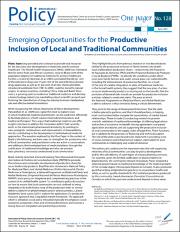Please use this identifier to cite or link to this item:
https://repositorio.ipea.gov.br/handle/11058/15277Files in This Item:
| File | Description | Size | Format | |
|---|---|---|---|---|
| en_IPCOnePager128.pdf | 59.25 kB | Adobe PDF |  View/Open |
| Title: | Emerging Opportunities for the Productive Inclusion of Local and Traditional Communities |
| Authors: | Lal, Radhika Junior, Waldemiro Francisco Sorte |
| Abstract: | Plants have long provided and continue to provide vital resources for the discovery and development of medicines and for primary healthcare. The World Health Organisation (WHO, 2008) has estimated that for some Asian and African countries, close to 80 per cent of the population depend on traditional medicine for primary healthcare. Further, a review by Newman et al. (2003) concluded that 60 per cent of the anticancer drugs and 75 per cent of the anti-infectious disease drugs approved, as well as 61 per cent of all new chemical entities introduced worldwide from 1981 to 2002, could be traced to natural origins. In various countries, including China, India and Brazil, there now is a growing push to modernise traditional medicine and develop a biotechnology industry by marshalling robust scientific research and fostering the manufacture of drugs by industry to ensure standardised, safe and effective herbal formulations. |
| metadata.dc.rights.holder: | International Policy Centre for Inclusive Growth United Nations Development Programme |
| metadata.dc.rights.license: | O texto e dados desta publicação podem ser reproduzidos desde que as fontes sejam citadas. Reproduções com fins comerciais são proibidas. |
| metadata.dc.type: | One Pager |
| Appears in Collections: | Publicações do IPC-IG |
Items in DSpace are protected by copyright, with all rights reserved, unless otherwise indicated.

